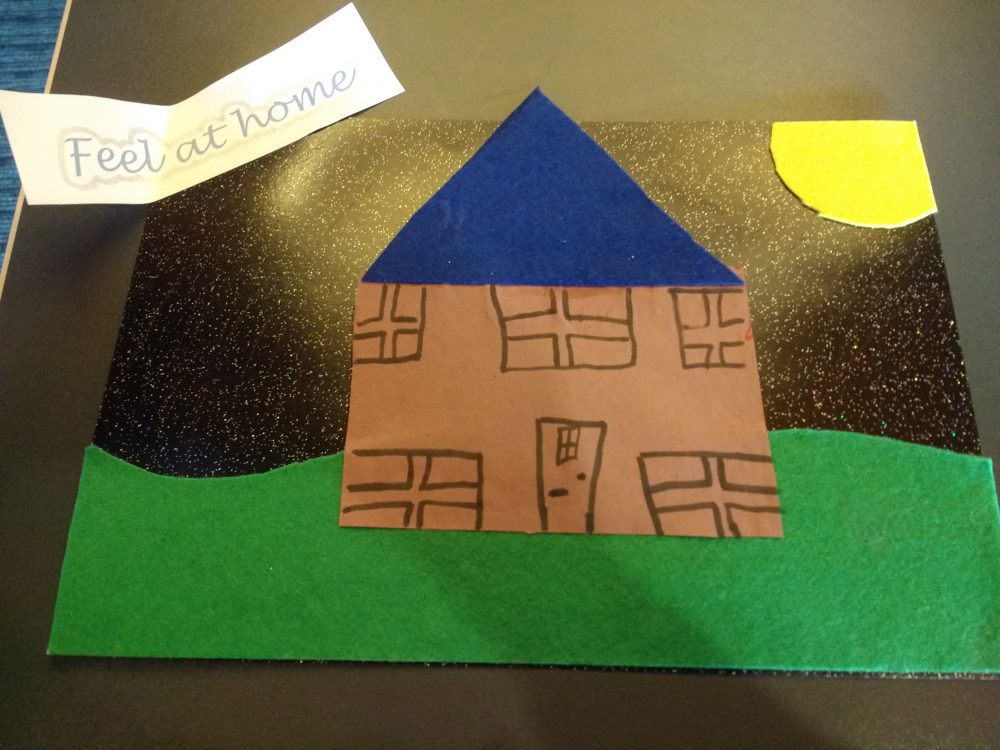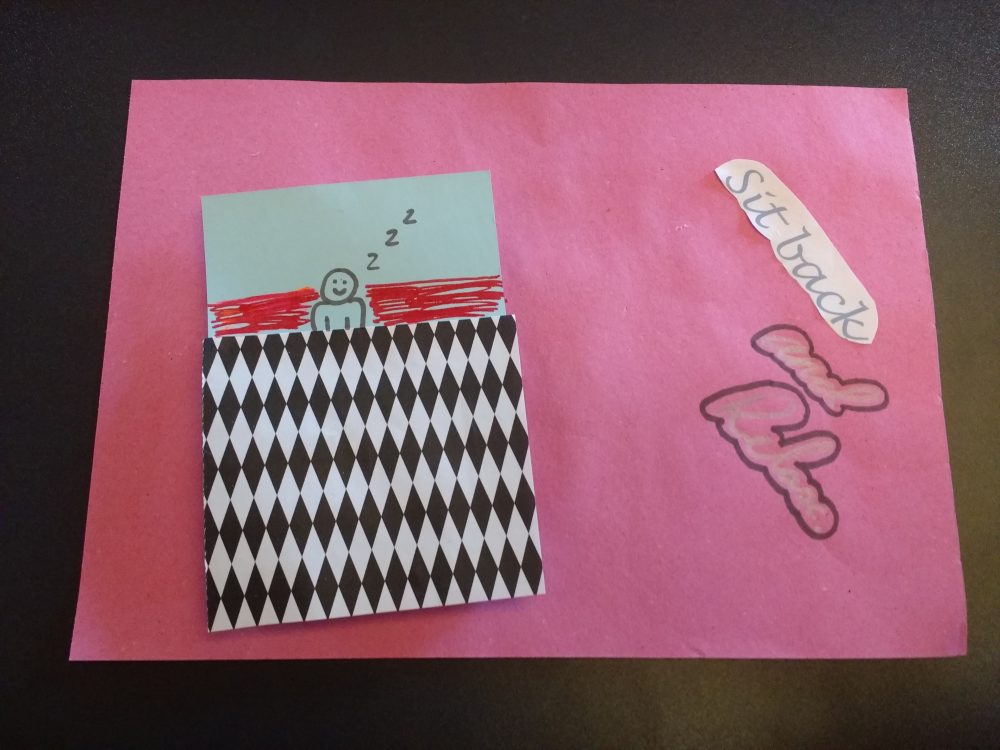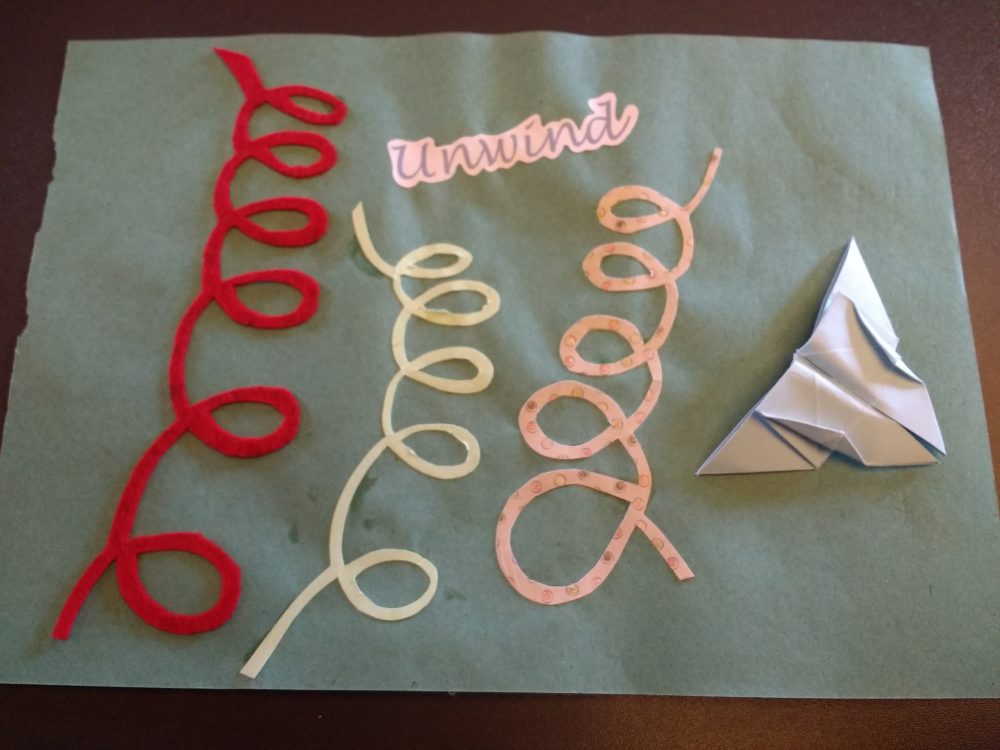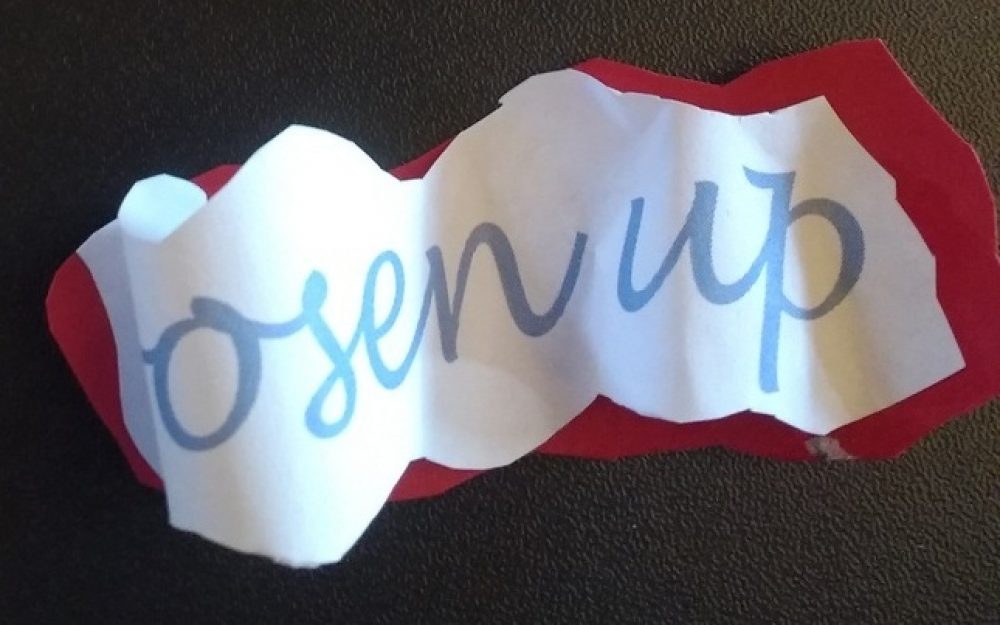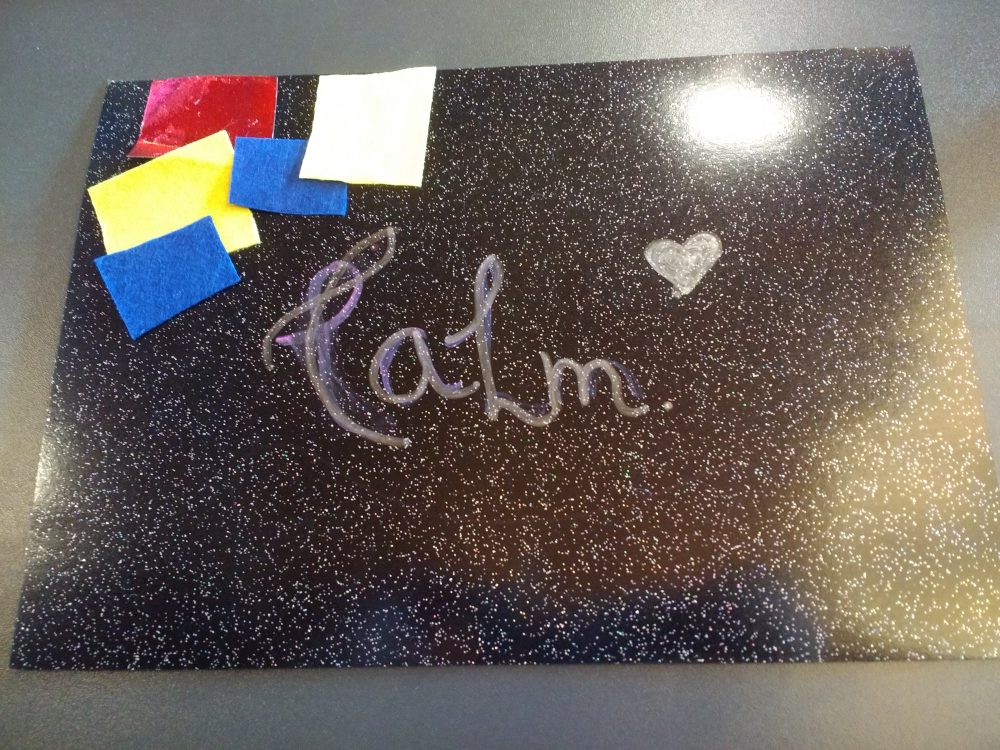You're on the Young People Site
Dedicated to self-harm recovery, insight and support.
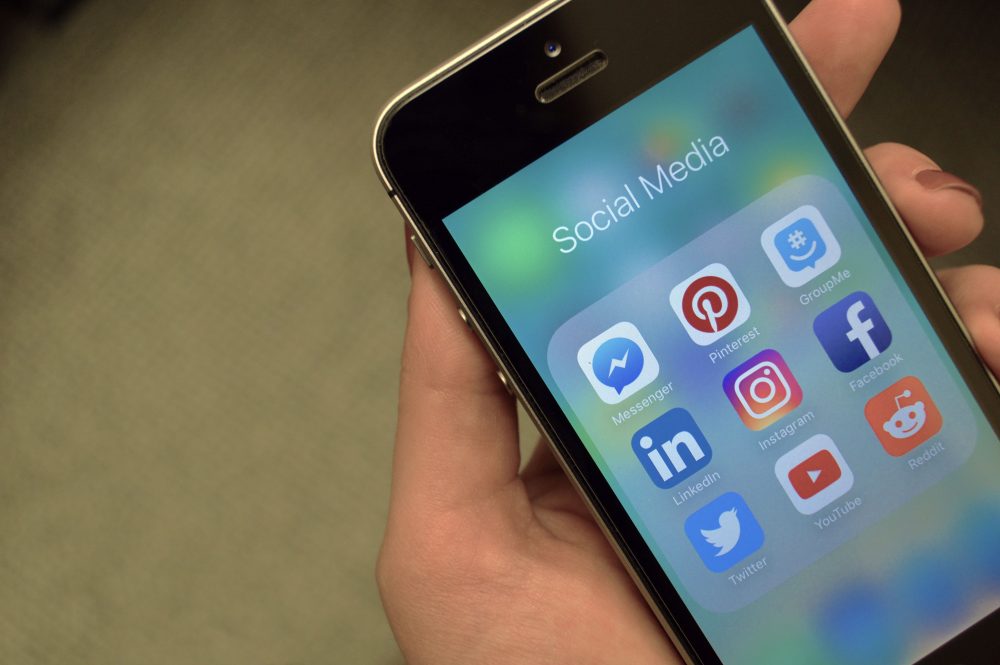
Jess Whittaker, a member of the SelfharmUK team, shares her thoughts about how you can stay smart on Instagram.
Today, as I was driving in to work, something I heard on the radio caught my attention and immediately made me turn up the volume. It was a report claiming that Instagram is one of the worst social media platforms when it comes to the impact on young people’s metal health.
In the UK, a survey of 1,479 people aged 14-24 were asked to rate which social media platform they felt had the most negative effect on them. They then scored each platform individually around issues like anxiety, depression, loneliness, bullying and body image.
Once the report had finished, I turned the radio off and thought for a moment. Like everything, Instagram has positive and negative sides to it, depending on what you use it for.
For example, lets’ say you’re someone who’s suffered from a mental health issue, such as self-harm or bulimia and are now in full recovery (well done you!). You might choose to use Instagram to share your story by posting inspiring quotes and photos that show the positive things in your life. There is no denying that Instagram is a really great way to visually spread positive messages quickly.
But what if you’re someone who spends hours on Instagram late at night, alone in your room, constantly comparing yourself to other people? You’ve stopped posting selfies because you’re so convinced that your photos look awful compared to your friends, that all you really use Instagram for now is to re-inforce your negative thoughts about yourself.
If you can relate to the above, don’t be embarrassed or afraid to speak up because… whoever you are and however you choose to use it, we have some great tips about how you can protect your mental health on Instagram:
- Limit the time you spend on there: like all social medias, Instagram can get kind of addictive. Whilst you might feel like time stands still when you’re on there, it doesn’t. You can literally Insta-away your whole weekend and before you know it, it’s Monday already and your back at School or College again! Just think of all that time wasted and all the fun things you could of been doing instead!? Next time you’re on there, set an alarm to ensure you don’t stay on there for too long, or only look during a short car ride somewhere. As soon as you are where you need to be, close your Instagram app and engage with your surroundings.
- Stop comparing yourself to others: this is a tough one. It’s easy for people to tell you not to compare yourself to others, but the truth is, it’s something that everyone has to deal with throughout their lives every now and again. It becomes a problem, however, when it starts to affect your self-esteem, so how you feel about yourself, and you stop doing the things you used to enjoy because you can’t see the point anymore. If you think Instagram (or any social media for that matter) is starting to make you feel that way, tell a family member or trusted adult. Speaking up isn’t easy, but talking about how you feel is the first step to getting help.
- Think that if it looks too good to be true - it probably is: chances are you already know this, but lots of photos we see on social media have been digitally manipulated. This means that they have been edited on a computer using software like Photoshop to make them look better than they are. Many of the Fashion brands or Celebrities you follow will use this technique, but it’s something we constantly have to remind ourselves of as they can become the norm and start to look real. Next time you see a photo of someone on Instagram, who looks too perfect to be real, have a laugh about the fact that nine times out of ten, they probably aren’t!
- Know where you can go for support if something you’ve seen is bothering you: if you see something on Instagram (or any other social media platform) that upsets you for any reason - report it using the options available, then tell a family member or trusted adult immediately. If you don’t want to talk about it with someone you know, you can call The Samaritans or Childline at any time.
- Don’t go on Instagram alone: at the end of the day, if you’re someone that has always struggled with how social media makes you feel, schedule times to login with your friends after School or College. This way you can instantly discuss anything that you have seen that is upsetting you and find out what your friends think. Again, if you’re still unsure, you can always talk to a family member or trusted adult.

This article was written by Sophie, a previous Graduate Volunteer with Youthscape, to celebrate World Music Day.
I am a massive lover of music; I’m constantly listening to it. I’ve actually got my headphones in now as I write this!
Music is powerful. It can be so influential, and can be used as a way to express feelings, share a particular message, tell a story, and bring people together. There’s always something for everyone’s taste. You can study music, create it, or simply just listen and appreciate it. There is so much I love about music, where do I even start?
I’ve grown up in a musical family. My dad led the music at Church and was always playing his guitar and singing around the house. Whenever we would see his side of the family, it would always end up in a good ol’ sing song, and it still does! My brother is also very musical and I’d say I am too, though not to the same extent – my guitar playing skills are a little rusty! However, as I said, I’m always listening to music, and it has certainly helped me through life.
Music is everywhere we go; most shops we go into will always have music playing in the background, and I’ve even been in some shops that have a DJ! I also particularly like the pianos at St Pancras train station, free for anyone to play. It amazes me how much talent there is out there, and being able to hear a performance live is always so great! I love when you can literally feel the music, the bass in your chest, those songs that give you goosebumps, music that really resonates with you.
I love that music is for any and every mood, from when you need a good cry, to when you’re absolutely pumped and feel on top of the world! Music would help me through times where I felt alone and it would sometimes express my emotions – you know, when there’s a song that completely describes how you’re feeling or what you’re going through? Or when a song puts into words what you struggle to? Music helps calm my anxiety and has distracted me when I need a break from what’s going on around me – headphones in, world out! Music can put me in an amazing mood, it can lift me if I’m feeling a bit down, it can bring back great memories and can make me want to sing and dance around wherever I am (and I will do so where appropriate!)
Music has got me through many hours of work, revision and essays. I know a lot of people who need silence to work, but music motivates me and helps me concentrate (most of the time). I remember my friend once telling me how she got around music being a distraction - she had started listening to songs in a different language so it meant she couldn’t get distracted by singing along to it!
I absolutely love how music brings people together, through the love of a song, band/artist, cause - we recently saw how so many people came together for the benefit concert, to help raise funds for the victims of the Manchester attack and their families. As well as people actually being at the concert, so many people tuned in to watch from home too. Music can connect people across cities, countries and continents, and in a way, it’s like a language we all share.
I just couldn’t imagine a world without music, could you? There are so many reasons to celebrate it today!

Is there a link between self-harm and eating disorders?
Self-harm in its broadest sense incorporates eating disorders as a type of harm to your health and body. But there are also links between self-harm and different types of eating disorders. Both behaviours affect a lot of young people, and they share a lot of the same traits, such as low self-esteem, a perfectionist personality, anxiety and sometimes a history of trauma, abuse or family difficulty. Of course every person and situation is different, though, and so we recognize that although these are the common themes they are not the only reasons behind such behaviours, and not everybody will cross over between the two.
The prevalence of self-harm in people with eating disorders is thought to be about 25%, and is particularly high among people who engage in the binge-purge cycle of Bulimia Nervosa. For many, self-harm and an eating disorder co-exist, but for others self-harm can develop to replace an eating disorder or vice versa. If someone tries to give up their harming when they are not psychologically ready (for example, doing it to please someone else) then another self-destructive symptom can easily develop in its place. This is because both conditions act as ways for an individual to cope with, block out, and release intense feelings of anger, shame, sadness, loneliness, or guilt. A person needs to be able to address these feelings and find ways of dealing with them in order to break free of the harming cycle.
For some people self-harm and eating disorders could also be a type of punishment and way of expressing self-hatred towards the body. If somebody has poor self-image and is suffering with an eating disorder, they probably experience feelings of self-loathing, which in turn leads to a lack of respect for their body. This can then open the door to something like self-harm. Within the world of someone with disordered eating, especially one built around control and routines, the addition of self-harm might then also become a way of punishing the self for not sticking to a strict routine, or provide relief from the constraints of that routine. The relationship between the two conditions is complex and can differ from person to person.
Self-harm often goes alongside other emotional difficulties and it is really important that all things are considered together and addressed fully, even if it is decided that the different symptoms will be treated separately. Self-harm and eating disorders, especially when occurring together, can seem like an impossible cycle to be trapped in, but recovery from both is very possible. Seeking professional support gives someone the best chance of making a full recovery.
If you or anyone you know is affected by an eating disorder, you can talk-one-to-one with someone from Beat via their web chat service.

The blog post below was written by Ellen.
When I was 11, I began to suffer from intense panic attacks and I turned to self harm to alleviate some of that pain. Seven years later, I’ve got a long list of diagnosis, including anorexia nervosa, depression and anxiety.
Throughout my GCSEs I barely went to school. I taught myself the courses at home and pushed through my exams. I managed to get A*s, but I couldn’t shake the feeling that I wasn’t really living.
The school I was in at the time was very focused on getting the top grades and getting girls into the ‘best' universities. But even at 11 I knew I didn’t want to be a lawyer or a doctor or an accountant or an engineer… but I couldn’t work out what I did want. And I’ve realised that that’s okay.
One of the biggest steps I’ve taken was starting therapy again. I stopped going for a long time because my body and mind were too weak to benefit from it because of my anorexia, but once I was at a stable weight I went back. My therapist has allowed me to open my eyes to the beauty in the world and always encourages me to chase my dreams, even if I’m not sure exactly what I want. She’s helped me to look for coincidences in life; the world starts to connect up and forms a safety net around you.
She was crucial in helping me transfer to an art college for sixth form, and it’s one of the best decisions I’ve ever made. Things are still really hard sometimes but I am learning to get in touch with myself more and I feel like the universe is there to support me.
I have found myself in art; I joined weekend classes in a London photography studio when I was 15 and I realised I could explore a format people want to see and that makes sense to me. I love to create narratives through both words and images; I am interested in psychology and colour theory and I use art to try and understand myself and others.

I created a scanography series in which I expressed my mental health journey through distorted self-portraits and eerie colour palettes. I was inspired by Amy Hughes, a painter I found reading Aesthetica magazine. Encased (2017) is psychologically and physically charged; I was struck by the strong highlights arching over a figure's back with an agonised, scrunched up face, distorted by the reflected light and texture of a plastic prison. I reached out to Amy and interviewed her for my project - she even invited me to the opening of her show! She encouraged me to express my true-self, which helped me develop my interest in the nature of mankind.

According to a survey carried out by the Mental Health Foundation 2018, 74% of adults in the UK alone report feeling overwhelmed or unable to cope. 51% of these adults felt depressed, and 61% felt anxious. 16% had self harmed and 32% said they had experienced suicidal thoughts. It is hard to tell whether we are just noticing and appreciating the effects of mental health more nowadays, or if there is a crisis as dramatic as reported. Either way, to experience mental health issues or to support someone with them is incredibly, painstakingly hard. I know from my own experience how isolated, hopeless and empty these problems can make you feel. Some of my images are my attempt at describing how you can feel like you're living multiple lives; we lie to people and tell them we're okay, we are misunderstood by others, and we don't know how we even really feel.
As the scanner moved, I lifted my head and lowered it at regular intervals to create the more frozen style of image. I’ve also tried to depict the feelings of isolation, disorientation and sadness. I pressed my face against the scanner to create visible pressure on my nose and forehead; the world is so vast and scary, yet we can feel caught-up and claustrophobic living in it. The qualities of the images create a kind of wavering mood-line - a bit like a line graph - as well as confusion and feeling out of control. I moved my face along with the scanner, not worrying about the slight shake of my body as I did so as this is what created the wavering effect.

I didn't want to make them specific to any one mental health issue; they are universal and can be understood by many. For instance, some images may as a representation of schizophrenia. I wanted to create a sense of understanding for those suffering due to mental health issues, be it the one who is ill or the one caring for them, and also to educate those who think the mentally ill are simply 'over dramatic' or 'not worth helping'.
Reasons to try being creative 🎨...
1️⃣ Creatives activities can help to reduce stress levels, aid mental calmness and serve as a relaxing distraction. You can get absorbed in your mental flow when creating.
2️⃣ Art also helps creative thinking; it can better your problem-solving skills. There are no wrong answers in art and we are allowed to imagine our own solutions. Flexible thought can stimulate in the way that learning a new language can.
3️⃣ Art can improve cognitive abilities and memory for people with serious brain disorders, such as dementia, by stimulating cell growth in the brain.
4️⃣ Chronic health conditions can be left behind while you create; a positive experience, and a chance to achieve allows you to express your feelings and help you find your identity.
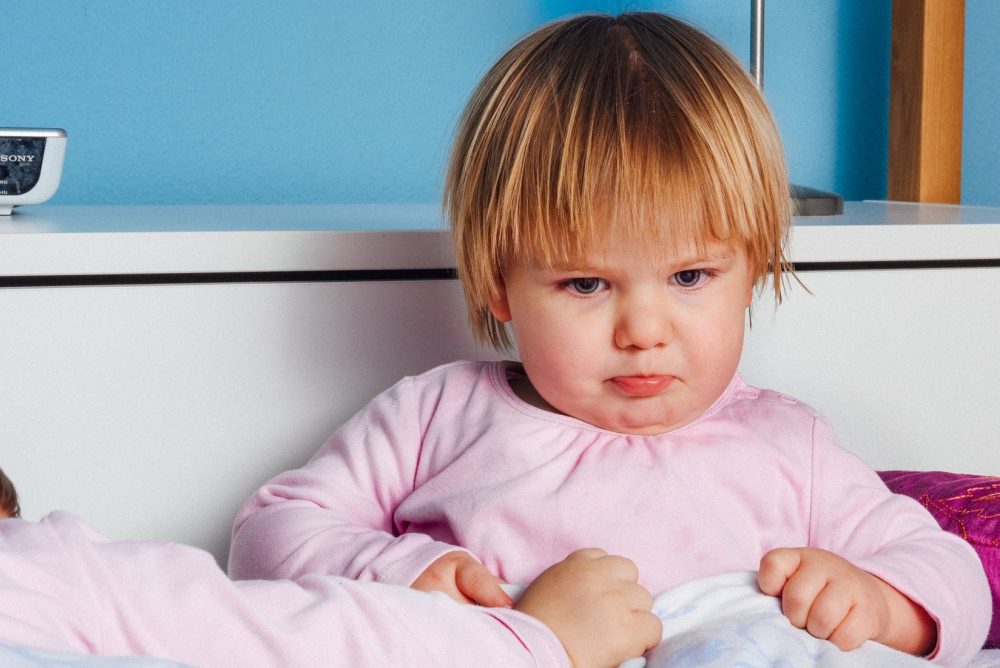
The blog below was written by Aurora.
Even if you’re like me and don’t go in for New Years resolutions, you probably started January with a lot of excitement, great expectations and ideas of what you were going to do differently, and how you were going to accomplish all the things you didn’t get to do last year.
And now, a few weeks later, you’re probably finding that you haven’t even started on half the things you promised yourself you would do, and that your energy and motivation have taken a big dive. If that’s the case, then you’re probably feeling angry and disappointed with yourself. Maybe embarrassed, if you’d boasted to your family, friends and colleagues about what you were going to do. This disappointment can often reinforce the bad habits you were trying to beat, and this can make it even harder to get up and try again.
There are two important things to keep in mind if you’re in this situation.
The first is that it’s always difficult, after the Christmas break, to get back into the regular swing of school or work. It’s always going to be a bit jarring, so it’s natural that you’re going to be more tired in January than in other months of the year. So you shouldn’t be disappointed in yourself just because you’ve been struggling to find the necessary energy.
The second, and most important thing, to remember when planning your New Year goals is to keep them realistic. It’s very easy, at the dawn of the New Year, bursting with excitement and optimism, to set yourself really big objectives, or aim to achieve them in a brief amount of time.
For example, if you’re overweight and want to get fit, you might have said to yourself: “Okay, this year I’m going to hit the gym three times a week, and I’m going to go on a diet. No more Fried Chicken Fridays...” Or something along these lines.
You have to bear in mind that just dieting, or developing a regular exercise routine, is hard enough by itself. Especially if you’re not used to it. So attempting them both at the same time would be very difficult; particularly if you’re struggling to adapt back into school or work. You may have a better chance of success if you keep your goals small and specific. Set yourself a measurable plan instead of a few abstract ideas about what you want to achieve.
To be clear, there is absolutely nothing wrong with challenging yourself. It’s better to set the bar too high than to just skate through life with no challenge. But in order to accomplish your goals, you have to balance your desires with what you can realistically achieve, and remember that nothing worth having comes without time and effort, and the occasional lapse. Having a well thought plan will better prepare you for dealing with failures.
And remember, don’t be too hard on yourself if you stumble. It’s only January after all!
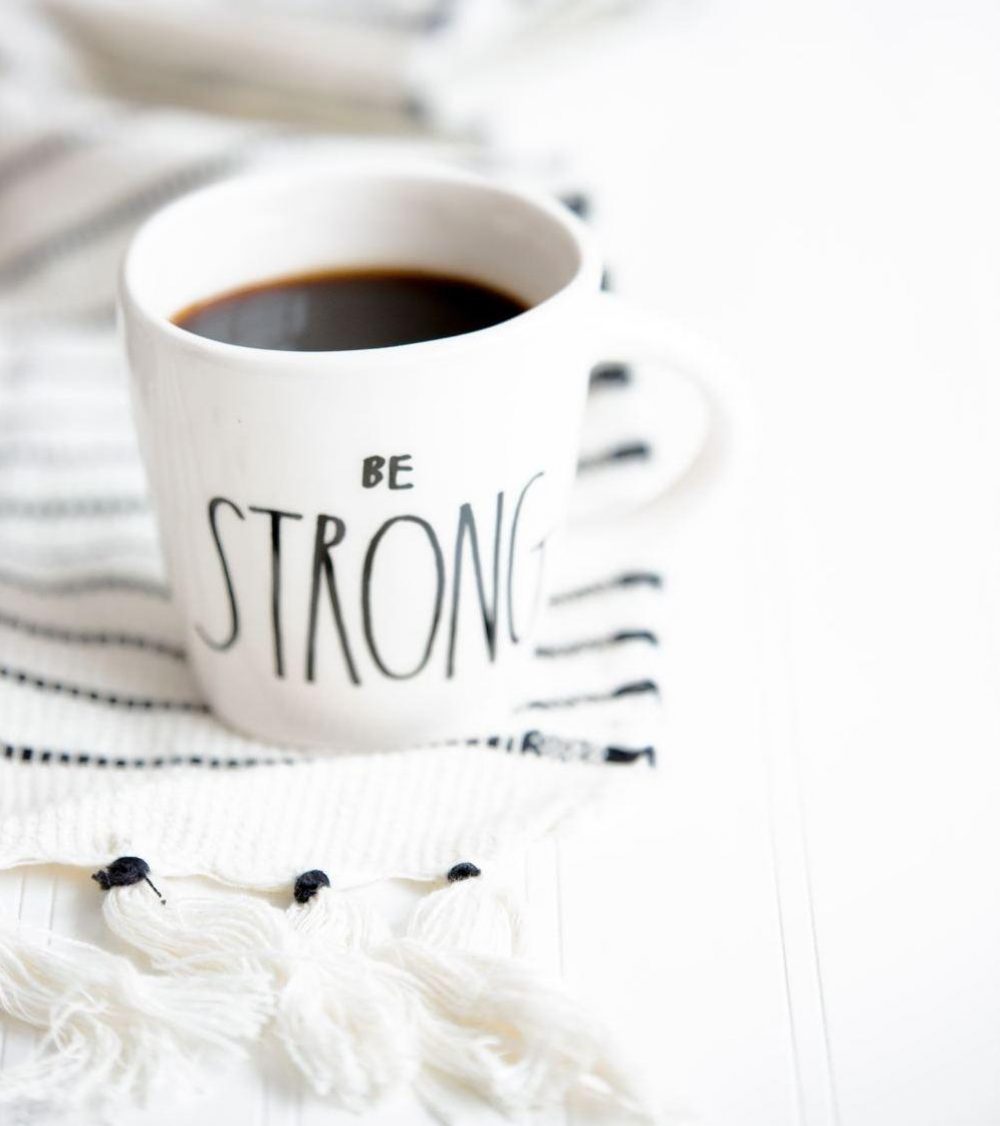
So, this isn’t Derren Brown stuff...
Honest!
Mind training is gently and kindly challenging your friend when they say negative things about themselves (that sounds way easier, eh!?).
Negative thoughts are part of our human mind set. Most of us have to fight the inner voice which tells us we are rubbish, ugly, fat, stupid or unkind at some points in our lives… The key to managing this negative inner voice is to train your brain to tell it to ‘get stuffed’!
If your friend says negative things about themselves often, here are some tips to help them ‘train their brain’:
- Listen to them – don’t say ‘that’s rubbish’
- Don’t get angry when they say negative things about themselves
- Do – ask them to say what the opposite is of the negative thought
- Do – ask them write the positive side of each negative thought they have
- Do – ask them to put the negative thoughts they have written in the bin
- Do – ask them to put the positive thoughts up in their room, or list them on their phone so they can see them and read them when they are saying negative things
- Do – do things together than are achievable and fun. If they hate ice – skating and fall over all the time, don’t go ice skating!
- Do – be positive in the words you use with your friend, even with ‘banter’! It has a huge effect.
Now, try it on yourself too – positive people have a better outlook on life!

We asked some people we work with the top things they like to do to look after themselves. They didn't have to be clever or super creative suggestions, all they had to be were real. 😉
💭"I recognise that sometimes I need time away from people and that’s OK. Yesterday I was feeling angry and stressed so I took an hour out in the middle of the day to just sit and read something that was nothing to do with work. I felt much better afterwards and was probably a much nicer person to be around too!"
- EMMA
💭"I’m hopeless at it but I know my mental health is better when I’m running regularly. It’s good for my physical health but I also appreciate the break from screens and conversation and a chance to sort out my thoughts while I run. The sense of achievement afterwards is a great encouragement too."
- JACK
💭"I like to get up early in the mornings and walk to a park near my house. There’s a bench at the top of the hill where you can see the whole town. It’s usually really quiet - just the birds singing and a handful of dog walkers. It’s a great place to pray and reflect on the day ahead."
- ABDUL
💭"Shower, tidy my room, and make myself a good dinner."
- FIONA
💭"I stretch! I like to do a few minutes of simple yoga stretching which makes me feel much better physically."
- TESSA
💭"I love taking time out for myself, and reading, with a cup of tea. I know it sounds boring, but taking some time for yourself is so important, and often overlooked as a form of simple self-care!"
- MEL
💭"I walk my dog. I have made friends." 🐶
- ROBBIE
💭"I have a bath. Or a snack. If at all possible I take myself out for coffee. I also like to re-read my favourite books sometimes."
- KATHERINE
💭"I try to do one good deed every day in order to always take something positive out of the previous 24 hours. I also like to appreciate what God has provided (one way I do it by seeing the beauty, diversity and produce in my garden). Another thing I sometimes like to do is to look up “worse day than you” on YouTube!"
- NEIL
~~~~ 🎊 How do you like to look after yourself? 🎊~~~~

The blog post below was written by Ellen.
The arrival of the New Year can make us feel like we should be transforming into brand new people, and while having New Years Resolutions is a great idea, sometimes the pressure can feel overwhelming.
If you’re reading this then you probably know that self-harm isn’t an easy thing to quit. Like with any addiction, it takes time to get to a place where you’re ready to stop. It’s important to remember that it’s okay to slip up; just because you take a few steps backwards doesn’t mean you can’t then take some strides forward.Megan McArdle, author of ‘The Up Side of Down’ writes that, “failure is a roadmap for what not to do next time.”
Sometimes setting ourselves concrete New Years Resolutions can be incredibly daunting; in fact, it seems more of us give up on them when we’re overly strict with ourselves. It might be an idea to think of more flexible goals: e.g. you could aim to ‘self harm less’ rather than saying you’re going to ‘stop self harming completely’. You could also approach it from a slightly different viewpoint: ‘This year I’m going to find another way to cope with my feelings.’ Maybe you could aim to understand what triggers your urge to self harm and develop ideas of how to beat the urge before it gets too much.
One good thing about New Years is it provides a neat opportunity to wipe the slate clean; stop holding onto all those times you felt bad, or felt like you’d let yourself down, and draw a line under the past year.
While there is an emphasis on parties and extravagance at this time of year, try to remember that what really matters is your own health and happiness. Take things at your own pace; set yourself goals that are realistic; be proud of yourself for all the good things you did in the year gone by. It’s easy to focus on what we’ve done wrong, or the disheartening stories we see in the news, but it’s important to remind yourself of what you’re grateful for and what you’ve achieved.
Jeremy Eden, author of ‘Low Hanging Fruit’, advises that we recognise the things in our lives that deserve “gold plating”, and realise that good is good enough for other things. And Bob Rosen, author of ‘Grounded’, reminds us that it’s perfectly okay to be selfish and take care of our own needs; “Our theory of human development is based on a model that you’re either selfish or you’re community orientated... The truth is that you need to be both. It’s not either-or.”
If you or someone you know self-harms it can be difficult to keep incidents in perspective. Yes, you should aim to (eventually) stop, but allow yourself enough time and expect a few bumps in the road. So maybe you have physical or metaphorical scars, but scars fade, and pain doesn’t last forever; start afresh and move on from what’s behind you.

A New Year reflection by Elizabeth.
First and foremost a shout out to SelfharmUK, they have been doing such a fantastic job of providing a platform for people to speak out.
When I started to open up about the challenges I was facing, (most of which only existed in my mind), things started to change for me. We all go through tough times, but know that without the valleys you can’t enjoy the hilltop experiences. So, here’s a little bit of my journey to where I am now.
Reflection for me is something I don’t do very often, I find it hard to do, particularly in the business of life. I find myself either constantly planning for the next thing and not enjoying each moment or being distracted by things around me (like pointless new feeds on my phone!). I noticed that I got to the point where I found it quite hard to remember what I was doing throughout each day. So, in January as we always do, I decided before I went to bed, I would reflect on the day and be thankful for conversations I had that day, people I’d met and moments I would learn from. Well like January resolutions happen, it started and stopped. One thought I do remember though, is how excited I was for the year ahead as I had several opportunities of leading at events and I had a few little breaks away with family. Little did I know that on one of my long weekends away, my boyfriend would propose to me! You never know what's around the corner.
In January I was starting a new job as a youth and children’s worker in my hometown, Leighton Buzzard. It has been my passion to be able to work with young people in my local area. Having struggled a lot, myself at school with friendships, self-confidence, and academia, I wanted to give back where my youth leaders had helped me. This new role couldn’t have come at a more poignant time. When I returned home, I found out that sadly there were three suicides in quick succession over the Christmas period. For me this just solidified the reasons why I wanted to go back. There desperately needed to be more support for every family, schools, and community.
Throughout this past year I’ve learned many lessons from this new role, some of which have been very painful, but all of which have helped build my character for the better. People pleasing, rest and time management are a few of those things I needed to change. I know that if I want to work with families, schools and communities I won’t please everyone. Not only that, I can’t take on other people’s problems, I can be there as someone to be listening and supporting, but I must learn to rest and take time out for me. Otherwise, I’ll burn out! This is something I find very difficult and I am constantly being reminded of that. For me, my relationship with Jesus is paramount to my everyday life, my identity is not in how much I do, or if something is successful or not, it is that I am loved by my father in Heaven.
One reflection this year I have enjoyed remembering is, the priceless moments of being able to tell those who needed to hear, listen to those who needed an ear and walk alongside those who needed a peer. Whether it be in our mums and tots’ groups, Sunday Celebrations, or our youth connect groups. I have been given the chance to have those one to one times and hear other stories. We have all taken some helpful insights from each other and been able to apply it to our life.
As each month has passed, I could easily have forgotten all the amazing opportunities I had. One, because I wanted to forget, and two, because of sheer busyness. I was being drawn out of my comfort zone so many times. On a few occasions, I was so anxious that I wanted to turn around and run away. I had to battle in my mind, constant negative thoughts, and the lies I kept hearing in my head like “I can’t do this”, “I’m not good enough”, “people are annoyed with you” etc. I can’t say I loved being in that place, but I can say we all go through hills and valleys. Without the bad experiences, you can’t appreciate the good ones. What good moments have you had this year that have helped shape you for the better?

The blog post below was written by Sophie, a previous Graduate Volunteer with SelfharmUK and Youthscape.
I’m not usually someone who gets really excited for Christmas Day. For as long as I can remember, I was always at my mum’s for half of the day and my dad’s for the other half. I never really had a problem with having two homes – it was quite nice sometimes! But Christmas is the time when having a broken family is highlighted. Seeing other people’s festive photos would get to me. Obviously I knew not everyone was having the perfect Christmas, but seeing friends having big, ‘perfect’ family do’s would just remind me that I didn’t have that. At one house, it was almost like people were trying to play happy families when it wasn’t the case at all. It just felt forced and awkward.
I don’t find it as much of an issue now, and I’m even prepared for the drama I know will take place this year! But around Christmastime, feelings are automatically triggered for me based on how I’ve experienced Christmas in the past. So over the years it’s become normal to not feel the best during this time, but it’s something that is changing!
A few years ago, I was out with some friends and the place where we were, happened to have a Christmas themed night (bearing in mind it was April, so I don’t know what was going on there!) They’d play a Christmas song every few songs and it got to the point where I had to take a step outside as it was just making me feel down. Of course, everyone LOVED it, and they were dancing around, singing at the top of their lungs. I thought everyone liked Christmas, until one of my friends joined me outside. I explained why I was out there, and she turned to me and shared how she didn’t really like Christmas that much either. She was just going along with it, having a sing and dance. It was SO refreshing to hear I wasn’t the only one in there pretending.
However you are feeling this Christmas, you are not alone.
Did you know that it’s okay to not be okay at Christmas?
It sometimes seems like we have to be so joyful at Christmas, so we put on fake smiles and go along with the festivities when really, for some, it’s a time of pain, anxiety, stress. Perhaps Christmas reminds you that a loved one is no longer with you, perhaps it reminds you of how broken your family is. There are many reasons why Christmas may not be the happiest time of the year for you, and that’s totally okay.
The thing is, it’s pretty hard to avoid Christmas altogether, but there are always ways you can try and make it easier for yourself.
Knowing that the urge to self harm is usually heightened at Christmas can give you the upper hand as it won’t catch you off guard. It means you can come up with a number of distractions and other ways to cope in those moments. You can find some suggestions here. Take time for yourself this Christmas – you don’t have to fake how you’re feeling.
This year I’m choosing to shift my focus from the things I don’t like about Christmas, to the things I’m thankful for, appreciating what I do have rather than what I don’t. I want to be thinking more about the real meaning of Christmas rather than being so caught up in my own circumstances. I’m going to make more time for self-care; doing things that help energise and fill me rather than drain me.
A YouTuber I’ve found to be really helpful is Kati Morton. She is a licenced therapist and creates videos on a broad range of topics surrounding mental health and answers questions from her viewers. My particular favourite this year is a video where she gives some handy tips on how you can stay mindful at Christmas...
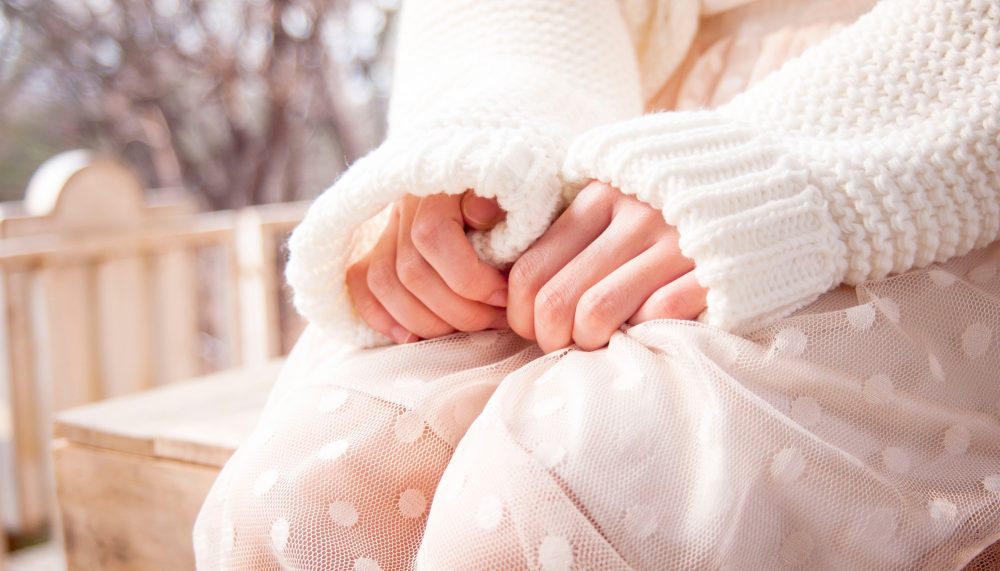
Some people like this lead up to Christmas, some (like me and my family!), really don’t!
The Christmas decorations look pretty and the shops get busier and the Christmas feeling is in the air – but it doesn’t make me get the warm Christmas glow; in fact it begins to make me stressed right from the moment it starts…
The pressure for the perfect film like Christmas family gathering is unachievable – the perfect family game time; the perfect present wrapping, the perfect friends to go out with, the perfect family to share it will – perfection doesn’t exist, in any place at any time.
The media Christmas portrayal adds to our sense of dread – the pressure to smile, laugh, not row, not feel sad – can make us feel very detached from Christmas: so this year, in the lead up here are some tips:
1. Ignore TV films and adverts! We aren’t going to reach a Hollywood Christmas ideal – so let’s not bother. Watch Elf and comedies – they keep a good perspective on it!
2. Try to imagine Christmas day now – what works for you? Do you need to communicate any of that to your family – who don’t you want to see over Christmas? How long do you have to visit relatives for? Begin to start the conversations now so they don’t come as a shock to your family – take control and be prepared to compromise.
3. Make stuff – loads and loads of stuff! Don’t buy it, make it. Keep your hands and mind busy, the personal stuff doesn’t need to cost much nor does it have to be perfect – enjoy the process and the result.
4. Don’t give yourself sky high expectations of yourself over Christmas. If you need to take regular breaks from family, do it. Look after yourself now so that you have the energy for it as it gets closer; plan out the Christmas holidays so that you get a good balance of rest and play.
Love,
The SelfharmUK Team

The piece below was written by Jo Fitzsimmons, a member of the SelfharmUK Team.
Try googling ‘the kindest person in the world’…
Weird isn't it?
It wasn’t people I had ever heard of; it was all very random. Some are global business people doing amazing things with their money; others are travellers who give away all they have; others still are people who have passed away and their families recall them as being the kindest person in the world.
Kindness isn’t measurable. There isn’t a kindness scale which we can ‘achieve’ kindness or check on our Social Media profile to see what marks out of 10 we have been given for kindness. Why?
🌎 Because kindness is quiet.
🌎 Because kindness is done every day a billion times over.
🌎 Because kindness doesn’t need a fanfare.
🌎 Because kindness only needs one person to know about it – the person on the receiving end.
Today is World Kindness Day.
There are incredible sad and desperate situations happening today all over the world that we are limited in what we can do to help – but, perhaps, we can buy a homeless person a hot drink? Perhaps we can volunteer at an animal shelter? Perhaps we can help tidy the house? Text a person we have been angry with? Say ‘thank you’ to a teacher who has helped us?
Perhaps the hardest and most challenging thing to do on World Kindness Day is be kind to ourself.
The ultimate person to be kind to is us.
What can you do to be kind to you today? Give yourself permission to rest? To laugh without feeling guilty? To tell that small critical voice that it doesn’t speak truth?
What would it look like to you to be kind today?
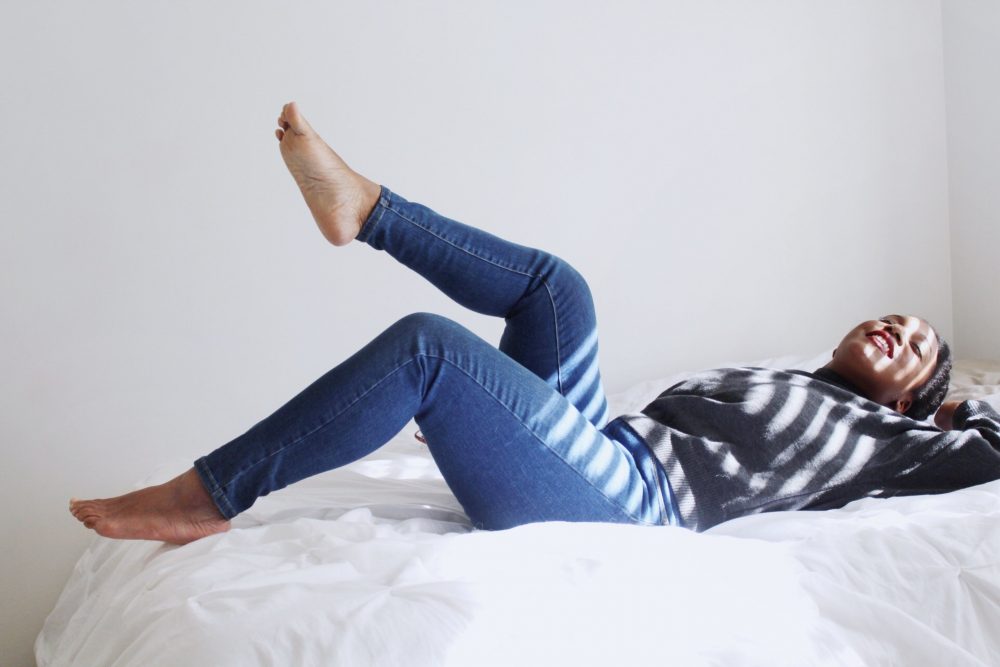
The blog below was written by Jo Fitzsimmons, a member of the SelfharmUK Team.
Caring for others is often far easier than caring for ourselves, don’t you think?
Listening to others is one of the best gifts we can offer someone – the chance to be heard, to empty their worries and fears with us and for us to offer care, support and hope – is an incredible life giving gift.
Yet; how much do we listen to ourselves? Do we allow our own fears, worries and thoughts to be hard by others?
How do we offer ourself the same care and friendship that we extend to those we love?
I’m getting a bit older now and (I like to think) a little wiser. I now recognise I can’t help everyone or rescue them from their situations, but I can offer a listening ear or kind word... Only if I offer myself the same self compassion and care that I offer them!
To do this, I like to write a list of all the nice, encouraging, kind, thoughtful things I do to help others – and I apply it to me.
I tell myself how strong I am; how brave I am; how proud I am of me; and how thoughtful I am. I encourage myself to speak out my worries to a trusted person so I don’t feel alone with my fears; I allow myself to appreciate the things I am good at - and I outrightly laugh at myself when I make mistakes and look a bit silly!
For every person I help; I aim to help myself – by giving myself a break, by watching my favourite soap (Hollyoaks everytime!), by treating myself to a nice shampoo or baking a cake.
This week, on Self Care week, try one of these actions each day. It’s not selfish; it is life giving and will help you to become a better friend, a better son/daughter or a better sibling...
- Look in the mirror and say one thing you like about yourself
- Today, think of one good thing you have done to help someone and think about how it felt
- Encourage yourself – you are braver and stronger than you will ever realise
- Name one thing you are proud of in your life
- Do something thoughtful for yourself in the same way you would for a friend (bake your favourite cake/watch your favourite tv show)
- Take yourself to a place you enjoy
- Spend time with people who love you and make you smile
Now here's some GIFs to really get you in the mood 😂
Enjoy caring for you this Self Care Week!
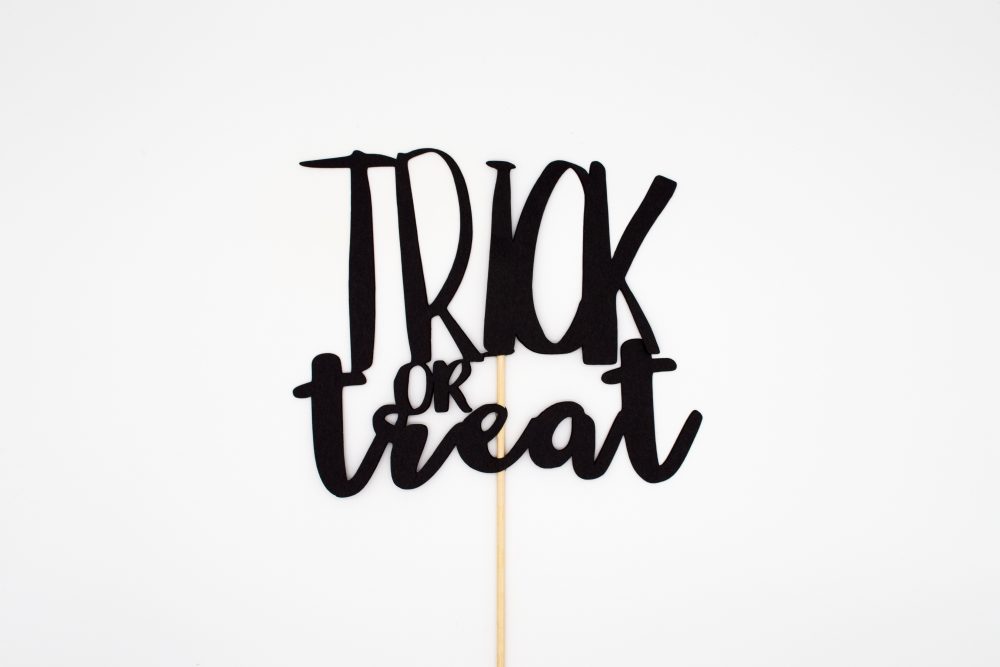
What are the things that weigh you down, hold you back and drain you?
We were thinking about this during the Hope Group earlier this week. If you don't know what the Hope Group is, you can read more about it here. What we found was - often the things that weigh us down, hold us back and drain us, are the things that bring us the most joy too.
For example, I really love my family, but sometimes it feels like they make my life a living hell at times! My mum in particular often weighs me down with lots of nagging and asking questions about what I'm doing at the weekend, and why I can't tidy up after myself. This type of criticism can make me feel increasingly drained, knocking my confidence and holding me back from doing things incase I'm no good at them.
Sometimes, writing down all the things in our head that we know are weighing us down, holding us back and draining us is a good exercise to do. This is because taking thoughts out of our head and onto paper can make them appear a lot less powerful and give us more control over them.
Here's the activity we did during the group...
Bandaged Mummies activity
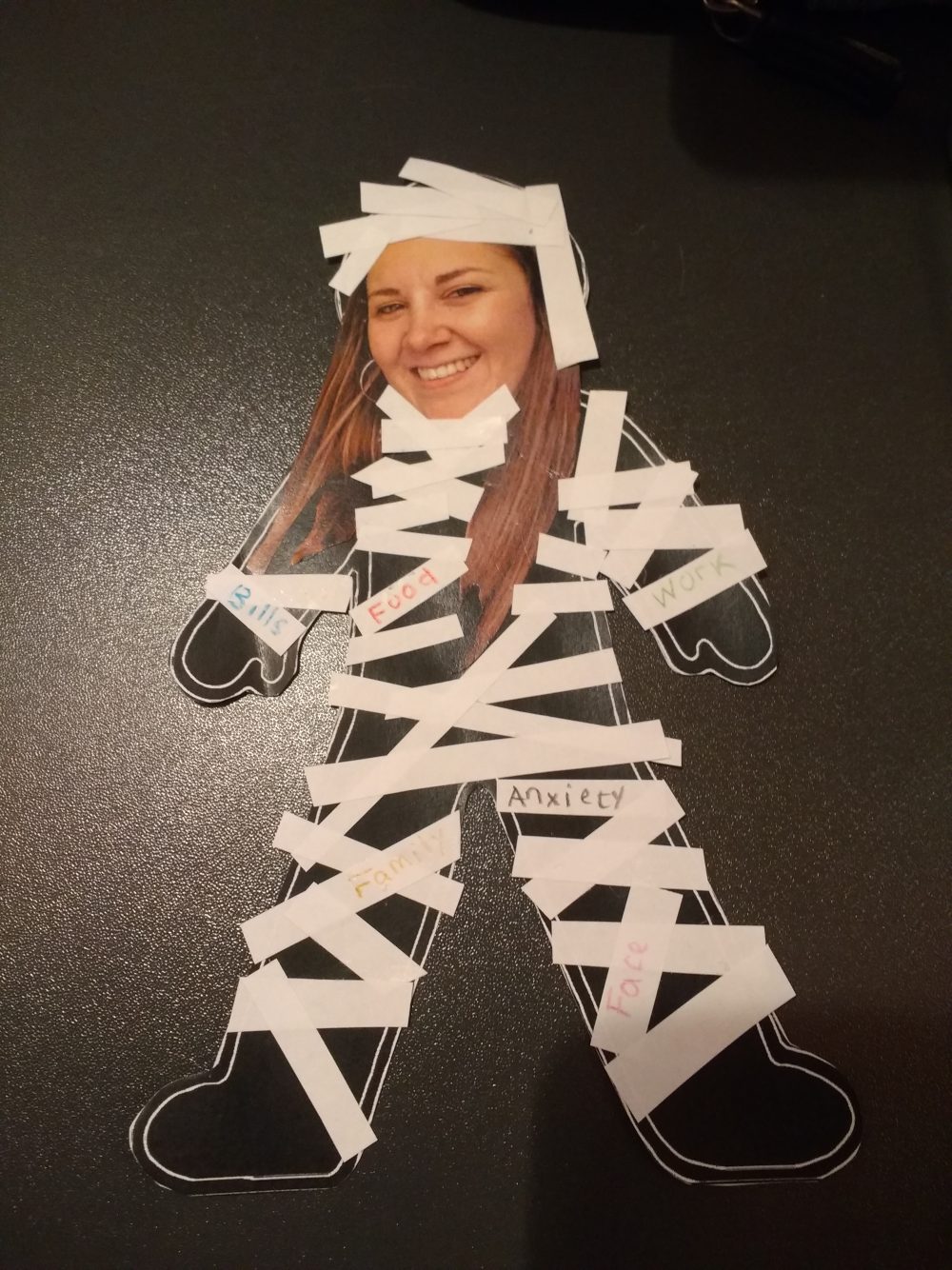
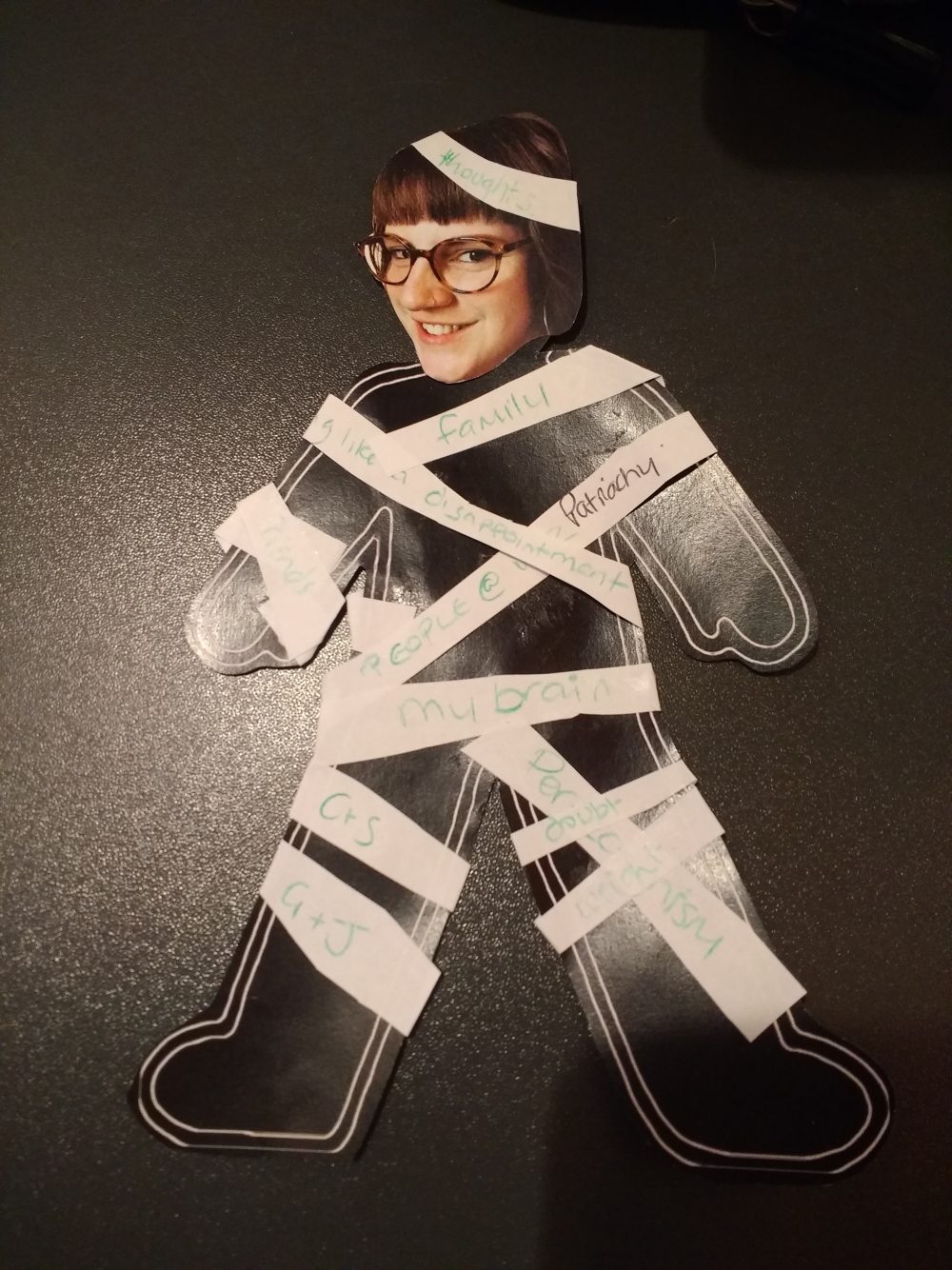
To make your own Bandaged Mummy, you will need:
- Scissors
- Glue
- Plain A4 white paper
- A photo of your head
- A piece of A4 black card
1) Use the black card to cut out a body shape
2) Cut out the photo of your head and stick it onto the body shape
3) Cut up strips of white paper and stick them like bandages on your mummy
4) Think about all the things that weigh you down, hold you back and drain you, and write them on the bandages
5) Keep your mummy as a reminder of all the things that can weigh you down, hold you back and drain you - BUT REMEMBER - you have control over how they make you feel!
Happy Halloween 🎃
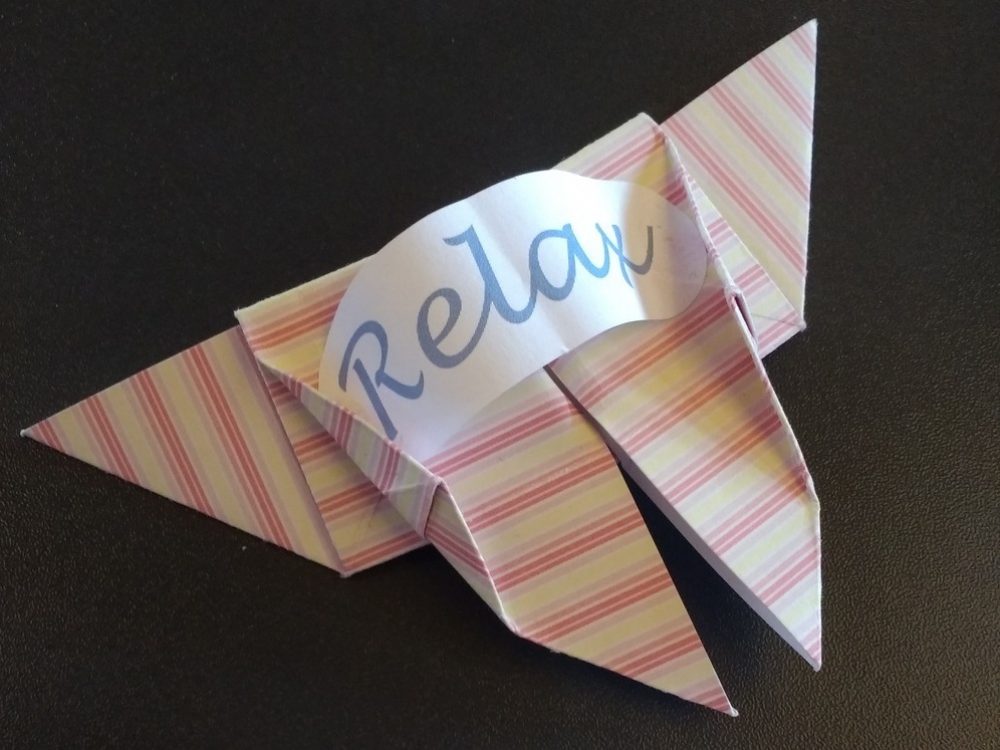
Last week at drop in was ‘relaxation week’. What’s drop in and why was it relaxation week we hear you ask? Well, drop in is basically what we call our after school club for young people. Every week night from 3.30pm until 6pm, young people from Schools all across Luton come and hangout here at the Youthscape building as soon as the bell rings for their final class. When they arrive, they usually head straight for the PlayStations, the pool table or to buy themselves a milkshake or a toastie! But that’s not all there is to do.
Every week, we have a different theme a drop in. The idea of each theme is to offer advice and to encourage young people to reflect on what that theme means to them and their life. To do this, we often set up activities and games based around that theme. For relaxation week, we were specifically looking at:
- Why rest and relaxation are important
- Different ways to relax and look after ourselves
- Relaxing physically, mentally, and spiritually
One of the activities we invited our young people to take part in order to explore what the word ‘relaxation’ actually meant, was collaging. If you search in a thesaurus, you’ll find that there are lots of words and phrases that mean ‘to relax’. ‘Unwind’, ‘loosen up’, ‘calm’, ‘sit back’ and ‘feel at home’ are just some examples. Can you think of anymore?
Using these words and phrases, we asked young people to pick the one that resonated with them the most, and to create an image or collage that visually represented how they interpreted it. Here’s how they got on…
👆 Some chose to create images that related to their lives specifically, by drawing their house or showing how they relax by sleeping.
👆Others made images that were very literal of the phrase they were trying to represent.
👆And some were a lot more abstract and emotive.
Whatever 'relaxation' means to you, make sure your taking time to look after yourself. This week, it's half term here across the Schools in Luton. We really hope our young people found this relaxation activity helpful as they prepared to take a break from their studies. If you wanted to try this activity at home, all you need is some bits of coloured and patterned card, some glue and some scissors. What does relaxation mean to you? 😊

